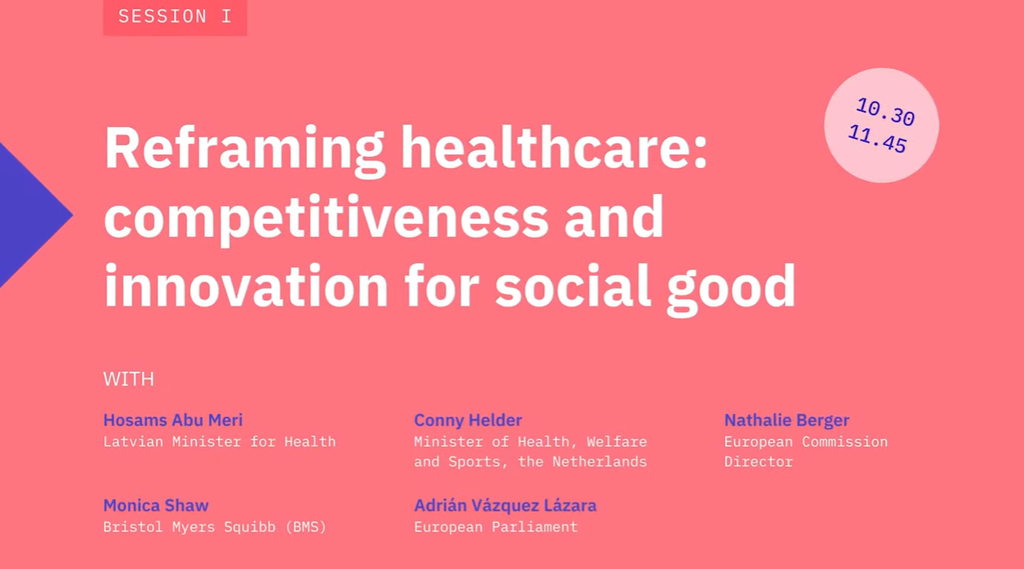Europe's moment: advancing clinical research and health innovation
Next event In person & online

- Area of Expertise
- Sustainable Livelihoods
Sustainable Livelihoods

Head of EU Government Affairs at Amgen
Investing in health leads to people living longer, healthier lives, which can result in improved health outcomes, increased economic productivity, promotion of new research and development (R&D) and improved overall population health. However, as we’re seeing in many EU countries, budgetary pressure often drives governments to implement cost-containment measures in various sectors, including healthcare and pharmaceuticals, which is exposed at times when health systems become overwhelmed and fragile, such as during the COVID-19 pandemic.
Governments and healthcare stakeholders, like Amgen, share a common vision to improve the health of citizens and to ensure access to healthcare. We recognise the resource allocation challenges healthcare systems face, but too often the short-term ‘fix’ of cost-cutting results in long-term problems. In times when EU countries are looking to reduce the impact of global budgetary pressures, it is critical to view health as an investment and not a cost.
Let’s consider how pharmaceutical innovation has led to significant improvements in health outcomes over the past decades. For example, new drugs have been developed to treat or prevent diseases, such as HIV/AIDS, cancer, cardiovascular, COVID-19 and other chronic diseases that were once considered untreatable. Recently, the regulatory and reimbursement framework in Europe was critical in enabling the speed of bringing about effective, innovative options for COVID-19. That same framework is critical to foster and accelerate innovation, and to ensure that each of the EU member countries has the most resilient health system possible.
Europe needs to create an environment that supports the development and delivery of the next generation of treatments, while also building a strong industrial and technological base
Amgen’s history is an example of why this framework is important. Initially beginning as a small start-up with a team of three and a good idea in 1980, Amgen has grown to be one of the world’s leading independent biotechnology companies and is developing a pipeline of medicines with breakaway potential. Amgen’s medicines have reached millions of patients around the world, and those currently available in Europe treat some of the region’s most serious diseases. The company’s current and future solutions are a result of an environment that favoured and supported innovation and investment in healthcare.
Further, government investment in health encourages public and private businesses, like Amgen, to take risks because there are incentives to do so when innovation is valued. In 2012, Amgen acquired Micromet, Inc., a start-up company that spun off from the University of Munich’s Institute of Immunology, which is now Amgen’s Research site in Munich. Micromet focused on developing therapeutic antibodies to treat untreated types of cancer. This acquisition enabled the development and delivery of a new breakthrough therapy for patients with unmet needs around the world that may have not been otherwise possible by Micromet alone. Now, Amgen is building upon this legacy and pioneering the future of oncology treatment with new technologies and targets to address remaining unmet patient needs.
Currently, there are worrying signs across the EU that long-term thinking about health systems and improving access to better health technologies is being sacrificed in favour of short-term fiscal outlooks. For example, the recent publication of the European Union’s pharmaceutical legislation could undermine R&D in Europe, fail to address access issues for patients and weaken the attractiveness for investment in the region. This, in addition to various other cost-containment measures happening at the EU and member state levels, leaves Europe’s industrial competitiveness in life science R&D is at serious risk. Perpetual cost-containment on medicines weakens medical progress and the ability to take the next quantum leap in healthcare and could inhibit new technologies by start-ups, like Micromet, from being able to reach and realise their full potential of treating patients in Europe with unmet needs.
Europe needs to create an environment that supports the development and delivery of the next generation of treatments, while also building a strong industrial and technological base. Medicines are essential for people to live longer, healthier, and more productive lives. When governments invest in health, they are investing in a healthier and more prosperous future.
This article is linked to Friends of Europe’s European Health Summit, held on 10 October 2023. This article is a contribution from a member or partner organisation of Friends of Europe. The views expressed in this #CriticalThinking article reflect those of the author(s) and not of Friends of Europe.
Next event In person & online

Past event In person & livestreamed

Past event In person

Past event In person & livestreamed





Stay informed
We use cookies and similar technologies to adjust your preferences, analyze traffic and measure the effectiveness of our campaigns. Learn more about our privacy policy.